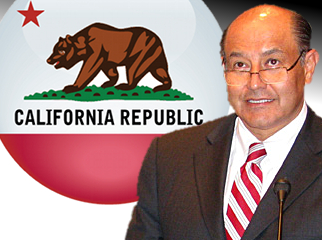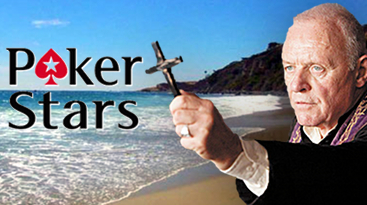 Online poker fans in California are celebrating the news that state Sen. Lou Correa (pictured right) has finally added some details to the SB 678 placeholder bill he introduced in February, but the legislation faces an uphill climb to be passed by the end of the current legislative session. On Monday, SB 678 was reclassified as an “urgency” bill, meaning it would take effect immediately upon passage, which would require a two-thirds majority vote in both houses of the state legislature. Trouble is, the current legislative session ends at midnight on Sept. 13, leaving a mere three weeks in which to overcome the stakeholder divisiveness that has prevented previous online poker bills from even coming up for a vote.
Online poker fans in California are celebrating the news that state Sen. Lou Correa (pictured right) has finally added some details to the SB 678 placeholder bill he introduced in February, but the legislation faces an uphill climb to be passed by the end of the current legislative session. On Monday, SB 678 was reclassified as an “urgency” bill, meaning it would take effect immediately upon passage, which would require a two-thirds majority vote in both houses of the state legislature. Trouble is, the current legislative session ends at midnight on Sept. 13, leaving a mere three weeks in which to overcome the stakeholder divisiveness that has prevented previous online poker bills from even coming up for a vote.
Correa says his bill is the result of “ongoing discussions with a broad coalition of California Indian gaming and non-gaming tribes” including the San Manuel Band of Mission Indians, who – along with the Morongo Band of Mission Indians – were the muscle behind the since disbanded California Online Poker Association (COPA). But David Quintana, spokesman for the California Tribal Business Alliance (CTBA) – some of whose members have rallied around a separate bill that has yet to be introduced – told the Los Angeles Times that Correa’s bill “is not going to move” in the legislature.
The bill’s first obstacle is the Governmental Organization committee, which is chaired by Sen. Rod Wright, who (re)introduced his own online poker bill in December. Unlike the other poker bills loitering around the state, Wright’s measure would allow not just tribes and card rooms to offer online poker, but horseracing tracks as well. Wright has yet to schedule hearings on any online gambling bills, including his own.
NUTS AND BOLTS (MOSTLY NUTS)
SB 678’s full text (read it here) makes its provisions severable, meaning any individual provision can be excised after passage without negating the entire bill. As for its actual content, the poker-only bill would allow card rooms and federally recognized tribes that have been offering poker for three years to apply for online poker licenses. Unlike the intrastate-only Pechanga-backed bill, Correa’s bill would allow the state to opt out of or into any federal online poker framework and would permit the signing of interstate compacts.
Operators would be taxed at 10% of gross gaming revenue, payable on a monthly basis. The bill doesn’t stipulate license fees or make any revenue projections. Platform operator licenses would be valid for 10-year periods, as would service provider licenses, while poker room operator licenses would be valid for five-years. Operators would be required to withhold 5% of players’ tournament winnings above $600 for the purpose of state income taxes.
There would be no limits on the number of online poker rooms the state could license, nor any limit on the number of rooms any individual operator could put online. Licensees could also authorize an unlimited number of ‘skins’ to ‘skin sponsors’ who meet licensing requirements. All initial licensees would face the same ‘go live’ date to ensure no operator gains a competitive advantage.
Online poker at internet cafés would be banned. Tribes already licensed by the state to offer gambling wouldn’t need to submit themselves to relicensing inspections or pay a license application fee to participate in the online poker scheme. Servers could be located outside the state provided they are used only for backup purposes. Players can’t fund their accounts via money orders or cash, so it’s check or credit card only.
 THE ‘POKERSTARS I CAST THEE OUT’ CLAUSE
THE ‘POKERSTARS I CAST THEE OUT’ CLAUSE
As for the dreaded ‘bad actor’ provisions, SB 678 bars any operator who accepted wagers from the US after Dec. 31, 2006, as well as any individual who held a direct or indirect financial interest in or “knowingly facilitated or otherwise provided services” to any company that did accept such wagers. Individuals or companies that have been convicted of a felony – including in foreign jurisdictions – or a misdemeanor “involving dishonesty or moral turpitude” in the past 10 years also need not apply. The same goes for any operator that has “contemptuously defied” any US or foreign investigative body looking into illegal poker-related activity or other “criminal profiteering activity or organized crime.”
SB 678 does allow an escape clause for operators who can “demonstrate by clear and convincing evidence” that its US-facing operations weren’t “unlawful under federal law and the laws of each state in which persons making the bets were located.” Any prosecution launched against such a company that ended “in a manner other than with a conviction shall not be regarded as evidence that the applicant’s conduct was not unlawful.” However, being found suitable by another state’s gaming agency “with expertise recognized within the gaming industry” will serve as a provisional finding of suitability until California’s gaming regulators make their own permanent finding on suitability.
Licensees are further prohibited from utilizing any brand, business name, trade or service mark that was used by any operator that took US wagers after October 16, 2006 (three days after President Bush signed the UIGEA into law). Waivers to get around this restriction can be issued provided it can be convincingly demonstrated that the asset in question was not used in violation of federal or state law.
Anyway, if you’ve reached the end of this article, congratulations are in order, because you’ve likely devoted more time to this bill than the rest of California’s legislature will. California Senate pro tem President Darrel Steinberg has already rubbished the likelihood of any online gambling legislation making the grade in this year’s session, so anti-online-everything Sheldon Adelson won’t likely lose any sleep over today’s events.
